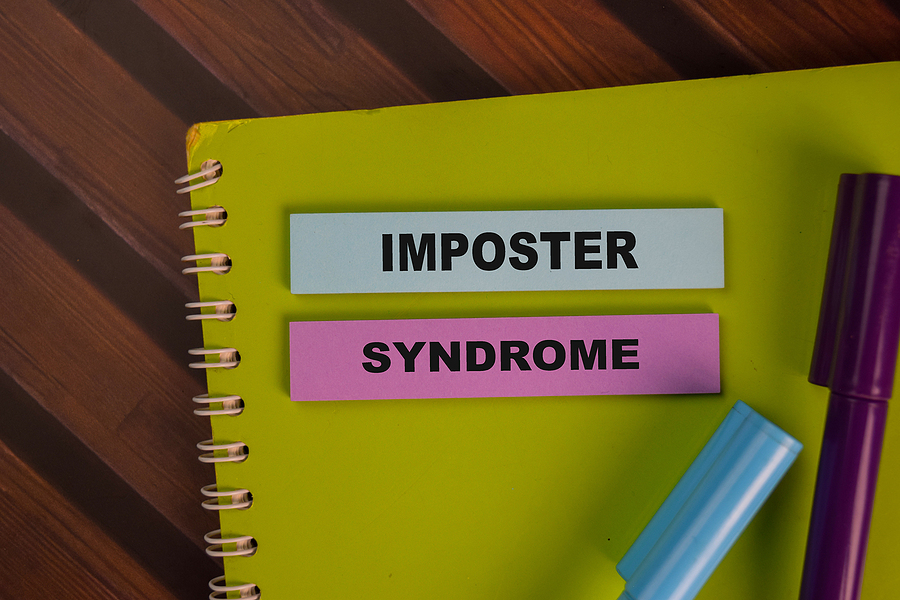
I’m an imposter. And it is LIBERATING to say that out, loud and proud. Read on to discover how feeling like an imposter is great – and three personal hacks on Imposter ‘Syndrome’.
First off, let’s debunk the idea that being an ‘imposter’ is a syndrome. A syndrome implies some notion that there is something wrong, or something to be fixed. In fact, being an imposter is something to be celebrated… hear me out.
As a coach, there are so many moments when I feel like an imposter. Every session there is something new being brought to the table. A certain not-knowingness of what the client will bring is where I find myself on a daily basis. Questions can creep into my head after a session such as ‘who am I to work with this level of client?’ Well, quite frankly, and what I’ve come to realise is that the real question is: ‘who am I NOT to work with this client?!’
When we take bold courageous steps or set ourselves challenging goals, we will generally move into unchartered territory, outside of our comfort zone. For any coaches reading this, in each session, we move to a position of not-knowing, placing ourselves in the position of the non-expert, we accept we are no longer the most experienced person in the room – that is our client. This can be an easy trigger to then think of oneself as not being good enough, or for want of a better word, the term ‘imposter’. However, in my experience being a non-expert is actually a position of great advantage. As the old adage goes – if you do what you’ve always done, you get what you always got… ‘imposters’ therefore come with a new perspective, a different angle of thought or feeling and for me, a childlike creative spirit.
Building on this notion of discomfort – which can be unsettling for coaches and leaders alike, the energy of our clients or team members can transfer onto us… it’s worth checking-in with yourself, is this discomfort, or sense of being an imposter mine or theirs? Perhaps you find yourself leading a team, a new team, an inexperienced team… if there’s an individual or collective of belief of inexperience, this energy can transfer over and take form in self-doubt, anxiety or some other trigger to feeling like an imposter. Either way, however it arrives at your door, welcome it! Share it with your clients if you’re a coach or team members if you’re a leader- and you feel safe to do so. Demonstrating such courage might just be the change in energy and example of possibility that is required to turn those frowns upside-down.
What else can we explore when it comes to being an imposter? Well, this is exactly what I mean. Ask yourself, ‘what else…?’ I love this question in coaching. It allows your subconscious do some of the heavy lifting. Explore what’s behind this belief that you are an imposter. Where does it come from? When does it arrive? How does it manifest? What makes it knock at your door? How do you feel about it? Who are you being when it arrives? Who are you when it isn’t there? What’s great about it? I would argue that there must be something it gives you or you wouldn’t be seeking it… once you’ve explored these questions, stay there. What else? Stay curious…
And lastly, when it comes to this imposter state – what emotions do you experience when you are this imposter? Does the emotion have a name? Anxiety? Nervousness? Fear? Fear of what – failure, rejection, embarrassment? Emotions are there to move us – they are not there to hold us. In short – we are not our emotions. We experience them and they are there to teach us something however they are not to make us into someone. They only become this when we attach our personal meaning to them. For example, in the past I would hear the words in my head or feel things such as ‘I’m scared’, ‘I’m scared of being ridiculed on social media’ (so I won’t write that post, or create that Assertiveness Course that I’ve dreamed of writing…). Now that I look back I can see what came after the feelings of being scared, of the fear that was holding me back. It was a sense of pride having overcome my demons. And yes, that Assertiveness Course did get written, just check out my website: Gareth – The Assertiveness Coach
So, to summarise:
Hack #1
Acknowledge that an imposter state signals so much more – it signals growth, learning, development and courage. If we’re going to attach (any) meaning to this situation, let’s frame it positively.
Hack #2
You are not an imposter, rather a non-expert. Non-experts bring with them a creativity and a child-like zest for discovery – it’s when we dream big and hold beliefs that we can be whoever we want to be…
Hack #3
Welcome the emotions and feelings associated with this imposter state. Even share them when you feel safe to do so… the light of your awareness will shine on those around you.
Overall for me, being an imposter is no longer something I can avoid – it’s something which I am coming to welcome… it’s been journey of acceptance, of finding my place and belonging in a new community. It’s about not always knowing where or what that looks like, sounds like or feels like – and being OK with that. More often than not (as someone very wise once told me) just my presence in a room is enough.
I work with many inspirational coaches who partner with me in bringing about sustainable, meaningful change in organisations. Drop me a message via one of the links below to discover more on how an assertive mindset and executive coaching can bring about the win:win scenarios for you and your teams.
One thought on “I’m an Imposter…”